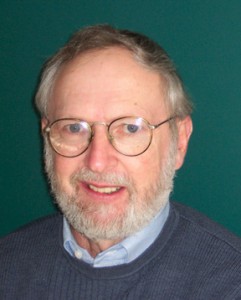
I’ve been writing about George Marsden’s talk to InterVarsity Graduate and Faculty Ministries at our recent staff conference. Over the last two weeks, I’ve written about Dr. Marsden’s belief that metaphysical naturalism is losing its hold on the academy and his endorsement for methodological naturalism as an appropriate stance for Christian faculty. Last week, I shared the question that I asked him:
Since we agree that methodological naturalism is a good way of doing academic work, but that privatization is a bad way of living out our faith, how do Christian scholars integrate their faith with their academic work?
Dr. Marsden suggested that a primary way that our faith influences our work is in the questions we ask. A common framework gives the same sets of facts to Christians and non-Christians alike, and the answers to our questions are found through a common methodology, but our ideological commitments shape the questions we pursue. He compared this process to the ways in which scholars have brought questions related to gender into the academic mainstream. So, then, Christians scholars will be asking different questions than non-Christians.
I think this is true, to an extent, though I was actually more intrigued by what came next. As with gender, Marsden said that Christian scholars need “consciousness-raising” about the influence of faith on their work. Scholars have to think hard about the ways that faith commitments already shape their scholarship.
Here, Marsden expresses something I’ve been wondering about for some time. A few years back, a senior engineering professor at a major research university told me that he had repeatedly seen Christians struggle to get tenure at his institution, primarily because their values were in conflict with the values of the university. The young Christian faculty wanted to be good teachers, good community members, active participants in the life of the university; meanwhile, the university was interested in their research, and not much else, at least in terms of their tenure decision.
I don’t want to suggest that this professor’s experience is paradigmatic —not all universities have such a narrow view of faculty. However, his observations imply that there is something different about Christian faculty, something that faculty themselves don’t always recognize, and which isn’t likely to appear in their publications. We need an understanding of “academic integration” that goes beyond research output and includes the full life and work of students and faculty.
What do you think? Does your faith affect the questions that you ask? Have you seen your faith shape your academic work?
The former Associate Director for the Emerging Scholars Network, Micheal lives in Cincinnati with his wife and three children and works as a web manager for a national storage and organization company. He writes about work, vocation, and finding meaning in what you do at No Small Actors.

I am so rusty on all this stuff. My own thinking on these questions was shaped when the debates over Intelligent Design were the hottest. I was pretty sympathetic to them at the time, but not satisfied. The whole ID project ended up intellectually stillborn in my opinion.
Still I think they had some valid points as regards the reality that methodology intersects with metaphysics at crucial points. If Christian scholars have something truly unique to add to the life of the mind it’s just at that point isn’t it? My point is not to quibble with the idea that faith influences the questions we ask. I’m sure Marsden means that as a starting point, and not a destination. Rather I think it’s worthy to ask, discipline by discipline perhaps, why metaphysics differs from methodology as it does. At that juncture, I believe, our faith has some things to offer the naturalists simply don’t.